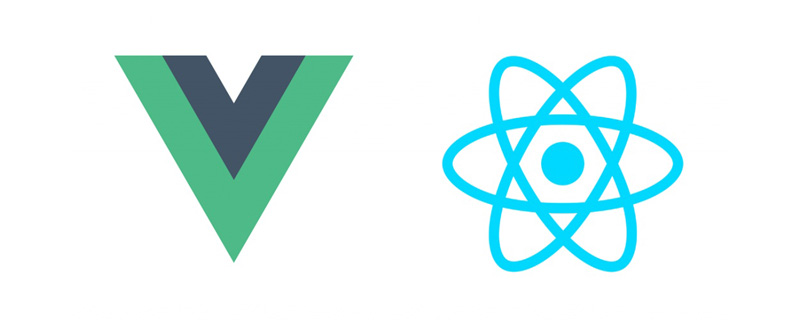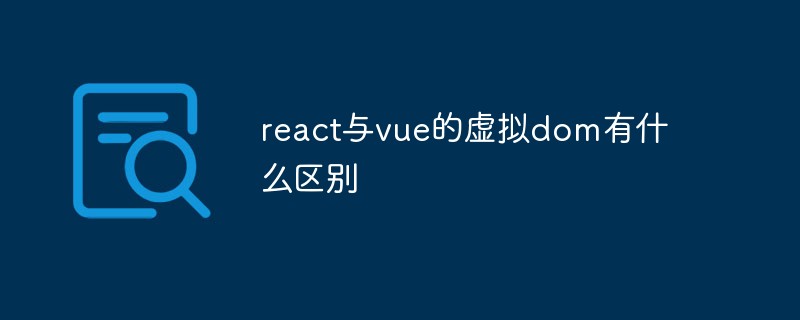Difference: 1. The instance has an el mount point, but the component does not. 2. In the instance, it is "data:{}", and in the component, it is "data(){return{}}". 3. The html elements of the vue instance are directly rendered into the page; while the html elements of the component are defined on the template and then rendered into the page through calls.

The operating environment of this tutorial: windows7 system, vue2.9.6 version, DELL G3 computer.
When I wrote vue single component items and routing last time, I thought of a problem. new Vue({…}) is a Vue instance, so is the component a Vue instance?
Analysis
As mentioned before, there are two development methods. One is browser-based (that is, main.js is introduced directly into the script), and the other is a command line-based development method built by vue-cli (a vue project).
Because the actual project is large Part of it uses the command line development method, so we still talk about components in the command line development method.
In the main.js of the project
// The Vue build version to load with the `import` command
// (runtime-only or standalone) has been set in webpack.base.conf with an alias.
import Vue from 'vue'
import App from './App'
import router from './router'
Vue.config.productionTip = false
/* eslint-disable no-new */
new Vue({//这里就是一个vue实例
el: '#app',//el挂载点
router,
components: { App },
template: '<App/>',//此处引根组件
})And in the App.vue code
<template>
<div>
<div>welcome! {{name}}, you are {{age}} years old</div>
<router-view></router-view>
</div>
</template>
<script>
export default {
name: 'App',
data:function(){
return {
name:'wangyue',
age:'25'
}
},
}
</script>
<style>
.welcome{
font-size: 32px;
color: blueviolet;
}
</style>
The renderings are as follows, you can ignore the ones under the purple text, here It is the content displayed by my route. 
Enlarge and compare


##The difference between instances and components in vuejs
The data of the component is a function and the non-component is data:{},The component does not have the el mount point option. According to the official website, components are reusable Vue instances with a name.
In a vue project, generally there is only one VUE instance defined in main.js, and the others are vue component instances. In fact, they are all Vue instances, but for the convenience of differentiation, I just said that. In addition to the root component, there are many small components in components. That is: 1. The vue instance has el to specify the mounting element, but the component does not, because the component is also called on the rendering page and rendered directly by calling the component name; 2. The data attribute forms of instances and components are different.The data attribute in the vue instance: data:{"name":"aa","age":18},data in the component Attributes: data(){ return{"name":"aa","age":18}},3. The html element of the vue instance is directly rendered into the page, while the html element of the component is Defined on the template, it is rendered to the page by calling itRelated recommendations: "vue.js Tutorial"
The above is the detailed content of What is the difference between instances and components in vuejs. For more information, please follow other related articles on the PHP Chinese website!
 vue中props可以传递函数吗Jun 16, 2022 am 10:39 AM
vue中props可以传递函数吗Jun 16, 2022 am 10:39 AMvue中props可以传递函数;vue中可以将字符串、数组、数字和对象作为props传递,props主要用于组件的传值,目的为了接收外面传过来的数据,语法为“export default {methods: {myFunction() {// ...}}};”。
 聊聊vue指令中的修饰符,常用事件修饰符总结May 09, 2022 am 11:07 AM
聊聊vue指令中的修饰符,常用事件修饰符总结May 09, 2022 am 11:07 AM本篇文章带大家聊聊vue指令中的修饰符,对比一下vue中的指令修饰符和dom事件中的event对象,介绍一下常用的事件修饰符,希望对大家有所帮助!
 如何覆盖组件库样式?React和Vue项目的解决方法浅析May 16, 2022 am 11:15 AM
如何覆盖组件库样式?React和Vue项目的解决方法浅析May 16, 2022 am 11:15 AM如何覆盖组件库样式?下面本篇文章给大家介绍一下React和Vue项目中优雅地覆盖组件库样式的方法,希望对大家有所帮助!
 react与vue的虚拟dom有什么区别Apr 22, 2022 am 11:11 AM
react与vue的虚拟dom有什么区别Apr 22, 2022 am 11:11 AMreact与vue的虚拟dom没有区别;react和vue的虚拟dom都是用js对象来模拟真实DOM,用虚拟DOM的diff来最小化更新真实DOM,可以减小不必要的性能损耗,按颗粒度分为不同的类型比较同层级dom节点,进行增、删、移的操作。


Hot AI Tools

Undresser.AI Undress
AI-powered app for creating realistic nude photos

AI Clothes Remover
Online AI tool for removing clothes from photos.

Undress AI Tool
Undress images for free

Clothoff.io
AI clothes remover

AI Hentai Generator
Generate AI Hentai for free.

Hot Article

Hot Tools

WebStorm Mac version
Useful JavaScript development tools

PhpStorm Mac version
The latest (2018.2.1) professional PHP integrated development tool

SublimeText3 Linux new version
SublimeText3 Linux latest version

Notepad++7.3.1
Easy-to-use and free code editor

MinGW - Minimalist GNU for Windows
This project is in the process of being migrated to osdn.net/projects/mingw, you can continue to follow us there. MinGW: A native Windows port of the GNU Compiler Collection (GCC), freely distributable import libraries and header files for building native Windows applications; includes extensions to the MSVC runtime to support C99 functionality. All MinGW software can run on 64-bit Windows platforms.











